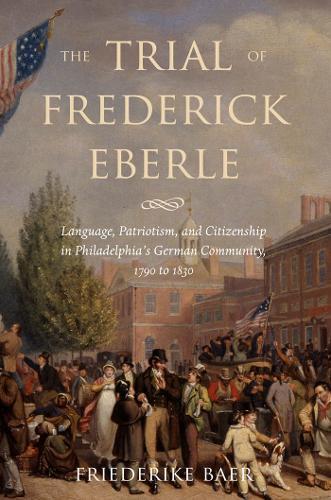Overview
Winner of the 2011 St. Paul, Biglerville Prize from the Lutheran Historical Society of the Mid-Atlantic In the summer of 1816, the state of Pennsylvania tried fifty-nine German-Americans on charges of conspiracy and rioting. The accused had, according to the indictment, conspired to prevent with physical force the introduction of the English language into the largest German church in North America, Philadelphia's Lutheran congregation of St. Michael's and Zion. The trial marked the climax of an increasingly violent conflict over language choice in Philadelphia's German community, with members bitterly divided into those who favored the exclusive use of German in their church, and those who preferred occasional services in English. At trial, witnesses, lawyers, defendants, and the judge explicitly linked language to class, citizenship, patriotism, religion, and violence. Mining many previously unexamined sources, including German-language writings, witness testimonies, and the opinions of prominent legal professionals, Friederike Baer uses legal conflict as a prism through which to explore the significance of language in the early American republic. The Trial of Frederick Eberle reminds us that debates over language have always been about far more than just language. Baer demonstrates that the 1816 trial was not a battle between Americans and immigrants, or German-speakers and English-speakers. Instead, the individuals involved in the case seized and exploited English and German as powerful symbols of competing cultural, economic, and social interests.
Full Product Details
Author: Friederike Baer
Publisher: New York University Press
Imprint: New York University Press
Dimensions:
Width: 15.20cm
, Height: 2.30cm
, Length: 22.90cm
Weight: 0.522kg
ISBN: 9780814799802
ISBN 10: 0814799809
Pages: 277
Publication Date: 10 May 2008
Audience:
College/higher education
,
Professional and scholarly
,
Undergraduate
,
Postgraduate, Research & Scholarly
Format: Hardback
Publisher's Status: Active
Availability: Manufactured on demand

We will order this item for you from a manufactured on demand supplier.
Reviews
This is microhistory at its best. Baer has selected a single event and brilliantly used it to explore the larger culture and society of the time. With great clarity and insight Baer has investigated multicultural issues of language and the assimilation of immigrants that are as relevant for us today as they were to Americans two centuries ago. This is a very important and timely book. -Gordon S. Wood,Brown University This case study is fascinating in part because of the richness of its sources. -The Journal of American History Vividly recreates this fascinating inter-ethnic group controversy about the meaning of language for culture and citizenship in the early republic. -American Historical Review Baer presents the larger history of the congregational conflict, which began long before the trial and continued long afterwards. She also exposes the thick complexity of the conflict, which involved competing understandings of citizenship in the new American republic. Hers is at once a social, cultural, and religious history. -Lutheran Quarterly
This is microhistory at its best. Baer has selected a single event and brilliantly used it to explore the larger culture and society of the time. With great clarity and insight Baer has investigated multicultural issues of language and the assimilation of immigrants that are as relevant for us today as they were to Americans two centuries ago. This is a very important and timely book. Gordon S. Wood, Brown University
This is microhistory at its best. Baer has selected a single event and brilliantly used it to explore the larger culture and society of the time. GORDON S. WOOD, Brown University
Author Information
Friederike Baer teaches American Studies at Temple University.




